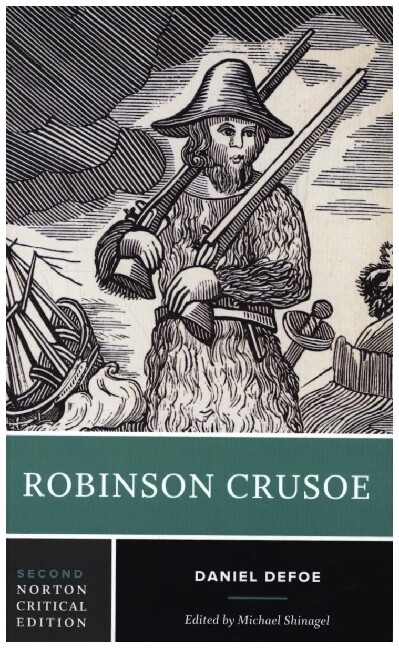
Zustellung: Mi, 27.11. - Fr, 29.11.
Sofort lieferbar
VersandkostenfreiBestellen & in Filiale abholen:
"Robinson Crusoe" has been long established as a utopian novel and a study of isolation. This edition is based on the Shakespeare Head Press reprint of the first edition. A criticism section includes pieces by leading Defoe scholars
Michael Shinagel has collated the reprint with all six authorized editions published by Taylor in 1719 to achieve a text that is faithful to Defoe's original edition. Annotations assist the reader with obscure words and idioms, biblical references, and nautical terms.
"Contexts" helps the reader understand the novel's historical and religious significance. Included are four contemporary accounts of marooned men, Defoe's autobiographical passages on the novel's allegorical foundation, and aspects of the Puritan emblematic tradition essential for understanding the novel's religious aspects.
"Eighteenth-and Nineteenth-Century Opinions" is a comprehensive study of early estimations by prominent literary and political figures, including Alexander Pope, Jean-Jacques Rousseau, Samuel Johnson, Samuel Taylor Coleridge, William Wordsworth, Edgar Allen Poe, Thomas Babington Macaulay, Charles Dickens, Karl Marx, and John Stuart Mill.
"Twentieth-Century Criticism" is a collection of fourteen essays (five of them new to the Second Edition) that presents a variety of perspectives on Robinson Crusoe by Virginia Woolf, Ian Watt, Eric Berne, Maximillian E. Novak, Frank Budgen, James Joyce, George A. Starr, J. Paul Hunter, James Sutherland, John J. Richetti, Leopold Damrosch, Jr. , John Bender, Michael McKeon, and Carol Houlihan Flynn.
A Chronology of Defoe's life and work and an updated Selected Bibliography are also included.
"Contexts" helps the reader understand the novel's historical and religious significance. Included are four contemporary accounts of marooned men, Defoe's autobiographical passages on the novel's allegorical foundation, and aspects of the Puritan emblematic tradition essential for understanding the novel's religious aspects.
"Eighteenth-and Nineteenth-Century Opinions" is a comprehensive study of early estimations by prominent literary and political figures, including Alexander Pope, Jean-Jacques Rousseau, Samuel Johnson, Samuel Taylor Coleridge, William Wordsworth, Edgar Allen Poe, Thomas Babington Macaulay, Charles Dickens, Karl Marx, and John Stuart Mill.
"Twentieth-Century Criticism" is a collection of fourteen essays (five of them new to the Second Edition) that presents a variety of perspectives on Robinson Crusoe by Virginia Woolf, Ian Watt, Eric Berne, Maximillian E. Novak, Frank Budgen, James Joyce, George A. Starr, J. Paul Hunter, James Sutherland, John J. Richetti, Leopold Damrosch, Jr. , John Bender, Michael McKeon, and Carol Houlihan Flynn.
A Chronology of Defoe's life and work and an updated Selected Bibliography are also included.
Mehr aus dieser Reihe
Produktdetails
Erscheinungsdatum
17. Dezember 1993
Sprache
englisch
Auflage
2nd edition
Seitenanzahl
448
Reihe
Norton Critical Editions
Autor/Autorin
Daniel Defoe
Herausgegeben von
Michael Shinagel
Verlag/Hersteller
Produktart
kartoniert
Abbildungen
w. ill.
Gewicht
430 g
Größe (L/B/H)
212/132/23 mm
ISBN
9780393964523
Bewertungen
LovelyBooks-Bewertung am 22.04.2015
Der Klassiker der Abenteuer-Literatur!































